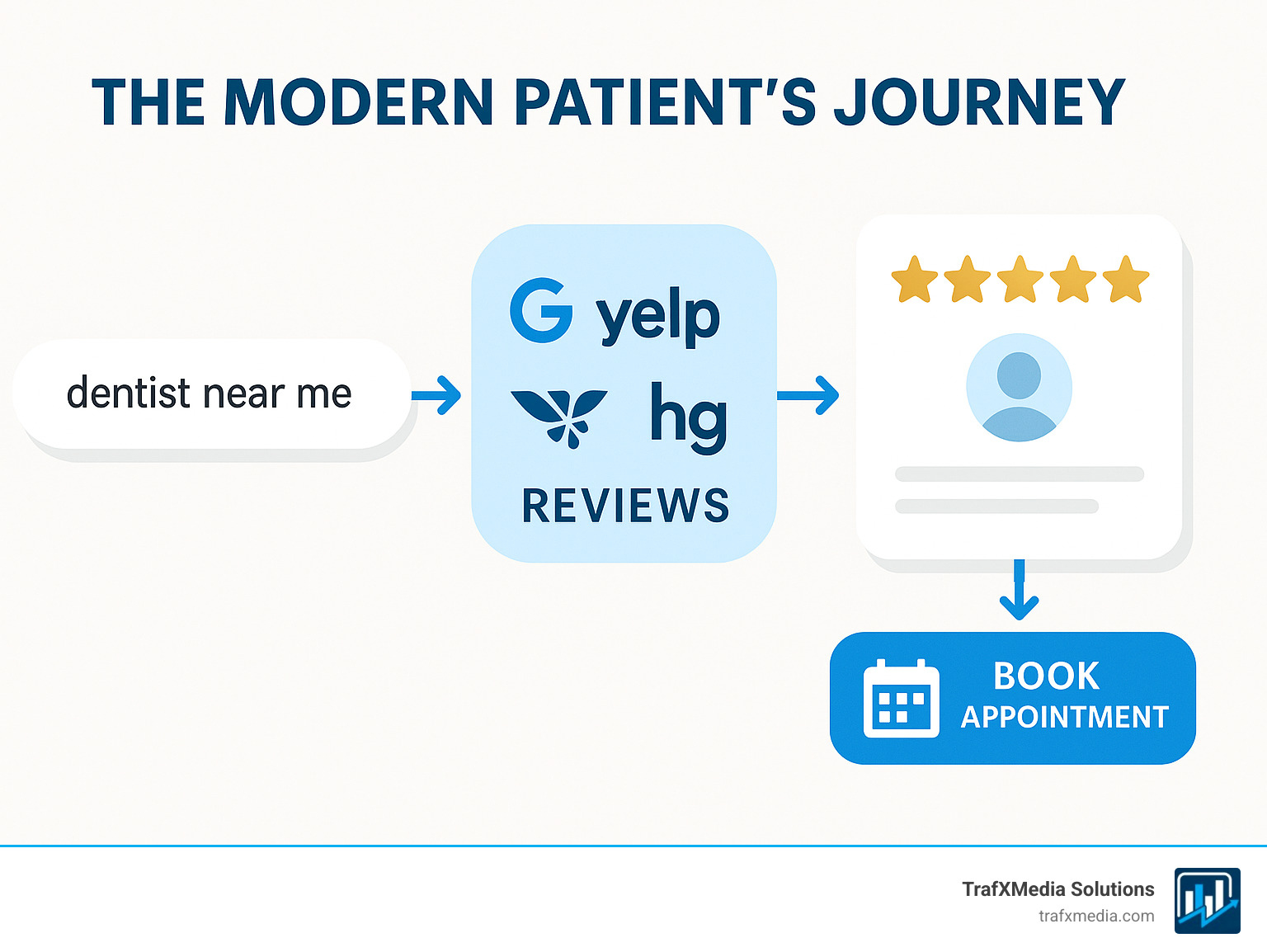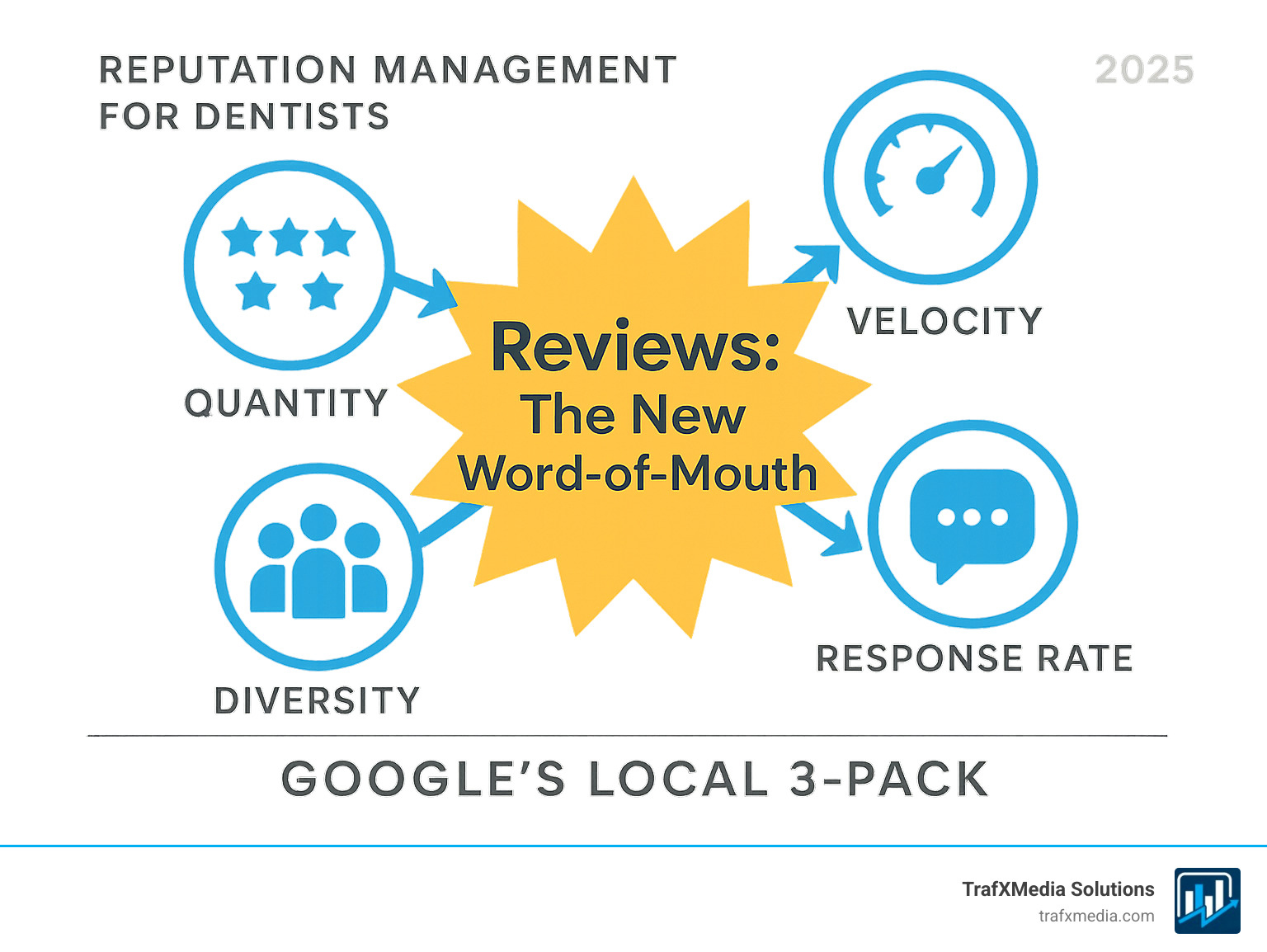Cavity-Free Reputation: Online Reputation Management Tips for Dentists
Why Your Online Reputation Can Make or Break Your Dental Practice
Reputation management for dentists is the comprehensive and ongoing process of monitoring, influencing, and managing your practice’s online presence to shape public perception. In today’s hyper-connected world, your online reputation is no longer a passive byproduct of your services; it is an active, dynamic asset that is a critical factor for patient acquisition, building foundational trust, and achieving sustainable practice growth. It encompasses everything from the star ratings on Google to the comments on your Facebook page and the sentiment expressed in detailed patient testimonials.
This digital-first reality means your reputation is being built and evaluated long before a potential patient ever steps into your office. The moment someone searches for “dentist near me,” they are met with a wall of options differentiated primarily by their online reviews and ratings. This is the make-or-break moment. A practice with a stellar 4.9-star rating and dozens of glowing reviews immediately projects trustworthiness and quality, leading to more clicks, calls, and appointments. Conversely, a practice with a 3.5-star rating, a few negative reviews, or worse, no recent reviews at all, can be perceived as risky, outdated, or unpopular, causing potential patients to scroll right past.
Research confirms this behavior with staggering clarity: 97% of consumers read online reviews for local businesses, including healthcare providers. This figure underscores that review consumption is a near-universal step in the modern patient’s decision-making process. Furthermore, 54% of consumers will only consider businesses with four or more stars, effectively cutting your potential patient pool in half if you fall below that threshold. The impact of negative feedback is even more stark, as up to 94% of people state that a negative review has deterred them from visiting a business. A single unresolved complaint about a rude front desk staff member or a painful procedure can cost you dozens of potential patients, while a consistent collection of positive reviews acts as your most powerful, 24/7 referral system.
To effectively manage this critical asset, a multi-faceted strategy is essential:
- Monitor Your Digital Footprint: This means actively tracking your practice’s name and your dentists’ names across Google, Yelp, Facebook, Healthgrades, and other health-specific sites. You need to know what is being said, where it’s being said, and when.
- Systematically Generate Positive Reviews: Don’t leave feedback to chance. Implement a consistent process for asking satisfied patients to share their experiences online, making it as easy as possible for them to do so.
- Respond Professionally and Promptly to All Reviews: Engaging with both positive and negative feedback shows you are attentive and care about the patient experience. All responses must be carefully crafted to ensure strict HIPAA compliance.
- Optimize Your Online Profiles: Ensure all your listings are claimed, complete, and consistent across all platforms. This improves local search visibility and presents a professional image.
- Address Negative Feedback Strategically: Negative reviews require a swift, empathetic, and professional response that aims to take sensitive discussions offline and demonstrate a commitment to service recovery.
I’m Richard Taylor, and I’ve spent years helping San Francisco dental practices build and protect their most valuable asset: their reputation. My experience has shown that world-class reputation management for dentists requires a nuanced understanding of patient psychology, strict patient privacy laws like HIPAA, dental marketing regulations, and the specific platforms where modern patients make their most important healthcare decisions.

Find more about reputation management for dentists:
- crisis management for businesses
- local SEO reputation management
- online reputation management san francisco
Why Your Online Reputation is a Dentist’s Most Critical Asset
Your dental practice’s online reputation is the foundation of your entire marketing ecosystem. It’s a living, breathing digital heartbeat that sends signals of trust and quality across the internet, impacting everything from new patient acquisition and case acceptance rates to staff morale and retention. In an era where patients are empowered with information, they actively seek social proof before making healthcare decisions. When a potential patient searches for a dentist, they aren’t just looking for a provider; they are looking for reasons to trust one. Your online reputation provides this crucial validation before they even contact you, building confidence and opening the doors for your practice 24/7.
Patient acquisition today is a direct result of your digital reputation. The modern patient’s journey begins with a need—a toothache, a desire for a brighter smile, or a routine check-up—and immediately moves to a search engine. They carefully read reviews, compare star ratings, and scan testimonials to gauge the experiences of others. A positive reputation, rich with authentic stories of gentle care and friendly staff, acts as a powerful magnet, drawing in new patients who already feel a sense of connection and trust. This initial trust not only secures the first appointment but also significantly boosts patient retention and word-of-mouth referrals, as existing patients feel validated in their choice and become your most enthusiastic advocates.
The benefits ripple outward, creating increased visibility in search results, fostering a positive brand perception, and establishing a significant competitive advantage. In a crowded local market, where many dental practices offer similar services, a superior reputation is often the key differentiator. Consistently high ratings and positive sentiment help you stand out and command a premium position. With 75% of people admitting they read online reviews for local businesses, your reputation is constantly being evaluated, making it a critical component of your brand’s health.
The Real-World Impact of Online Reviews
Online reviews have become the new currency of trust in healthcare, profoundly influencing patient decision-making. A robust collection of five-star ratings and genuine, detailed testimonials creates instant credibility. These reviews function as powerful trust signals that are often more persuasive and cost-effective than traditional advertising because they represent authentic, third-party validation. They address the inherent vulnerability and anxiety many patients feel about dental visits by providing reassurance from people just like them.
Conversely, the absence of a strong reputation—or the presence of a negative one—can be devastating. Star ratings create an immediate first impression that can either invite or repel potential patients. Since statistics show that 54% of consumers only consider businesses with four or more stars and a staggering 94% are deterred by negative reviews, the stakes could not be higher. Reviews offer unfiltered, authentic insights into every facet of the patient experience, from the warmth of the front desk to the dentist’s chairside manner. They serve as the personal recommendations that modern consumers not only prefer but demand.
Key Benefits of a Strong Reputation Management Strategy
A proactive reputation management for dentists strategy is not a defensive measure but a powerful engine for growth that strengthens your entire practice from the inside out. The core benefits are tangible and far-reaching:
- Improved Patient Trust and Confidence: A steady stream of positive feedback makes new patients feel secure and confident in choosing your practice, leading directly to an increased new patient flow and a more predictable appointment schedule.
- Higher Case Acceptance Rates: Trust is the cornerstone of case acceptance. When patients trust your expertise and your practice’s reputation for quality, they are significantly more likely to accept and invest in recommended treatment plans, from routine fillings to complex cosmetic or restorative procedures.
- Better Staff Morale and Retention: Public recognition is a powerful motivator. Positive reviews that praise your team’s professionalism, empathy, and skill reinforce their commitment to excellence and create a more positive work environment, which can help reduce costly staff turnover.
- Effective Crisis Mitigation: A large volume of positive reviews creates a reputational buffer. This deep well of goodwill minimizes the impact of any single negative comment, preventing one disgruntled patient from defining your practice online.
- Sustainable, Long-Term Practice Growth: A well-managed reputation is a compounding asset. It fuels sustainable growth by consistently attracting not only new patients but also top-tier talent, as skilled hygienists, associates, and office staff are drawn to successful, well-regarded practices.
All of these benefits contribute to building a memorable and respected dental brand that stands out in your community, fosters lasting relationships with patients, and secures the long-term financial health of your practice.
The Complete Playbook for Dental Review Management

Effective reputation management for dentists requires more than just occasionally checking your Google rating. It involves creating a systematic, practice-wide approach to encouraging, managing, and leveraging patient feedback. This playbook combines proactive strategies to consistently generate new reviews with intelligent reactive approaches to handle all types of comments with professionalism and care. When executed correctly, this system creates a virtuous patient feedback loop, where patient insights are used not only for marketing but also for tangible operational improvements, strengthening your practice from within.
Success hinges on making reputation management a part of your practice’s culture. This starts with comprehensive staff training. Your entire team, from the front desk to the clinical staff, should understand the importance of online reviews and be trained on the proper, non-intrusive language to use when requesting them. It’s also crucial to establish a clear service recovery plan. This protocol empowers your staff to identify and de-escalate issues in the office, turning a potentially negative experience into a positive outcome before it ever becomes a one-star review. Appointing a ‘reputation champion’ within your team can ensure consistent focus and accountability.
How to Proactively Generate More Positive Reviews
Experience shows that the vast majority of satisfied patients are willing to leave a review, but very few will do so without a prompt. Therefore, actively and consistently asking for reviews is the single most important part of building a 5-star reputation. The key is to make the process frictionless for happy patients. Here’s how:
- Perfect the In-Office Request: A personal, timely request is incredibly effective. Train your front desk staff or hygienists to identify patients who have expressed satisfaction and say something simple like, “We’re so glad you had a great visit! We’d be so grateful if you could take a moment to share your experience on Google. It really helps other patients find us.”
- Automate Email and Text Requests: Use reputation management software to send automated, personalized messages via email or SMS within a few hours of an appointment. This catches patients while the positive experience is still fresh in their minds and provides a direct link, removing any friction.
- Leverage QR Codes: Simplicity wins. Place QR codes on appointment cards, billing statements, or small signs at the front desk that link directly to your preferred review profiles (especially Google). This allows patients to leave a review with a quick scan of their phone.
- Create a Dedicated Website Review Page: Add a page to your website titled “Leave a Review” that features prominent, clickable logos for Google, Facebook, and other key platforms. This serves as a central hub for feedback.
Of course, the foundation of all positive reviews is genuine patient satisfaction. Consistently delivering exceptional clinical care and outstanding customer service is the fuel that powers your review generation engine.
How to Respond to All Types of Patient Feedback
Responding to reviews is non-negotiable. It demonstrates that you are engaged, value patient feedback, and are committed to transparency. Aim to respond to all new reviews within 24-48 hours with professionalism, empathy, and strict adherence to privacy laws.
- Positive Reviews: Don’t just say “Thanks.” Express genuine gratitude and personalize the response whenever possible without revealing private information. For example: “Thank you so much for your kind words! We strive to make every visit comfortable and are so happy to hear you had a positive experience with our team. We look forward to seeing you again!” This reinforces their positive feelings and shows appreciation.
- Negative Reviews: This is your opportunity to demonstrate grace under pressure, but it requires extreme care to maintain HIPAA compliance. Never confirm the person was a patient or discuss any aspect of their health or billing. The best practice is a three-step approach: 1. Acknowledge their feedback and express regret that their experience wasn’t positive. 2. Reiterate your commitment to patient satisfaction. 3. Provide an offline channel for resolution. For example: “We appreciate you taking the time to share your feedback. We are committed to providing the highest quality of care and service to all, and we are sorry to hear that your experience did not meet your expectations. Please contact our office manager, [Name], at [Phone Number] so we can listen to your concerns directly.”
- Neutral (3-Star) Reviews: Treat these as valuable opportunities. Thank the reviewer for their feedback, acknowledge the positive points they made, and address any critiques in a general, constructive way. A thoughtful response can often turn a neutral party into a future advocate.
Always adhere to the HIPAA Privacy Rule by keeping all public responses general and free of any Protected Health Information (PHI).
Handling Fake or Malicious Reviews
While frustrating, fake or malicious reviews are a manageable part of having an online presence. Telltale signs often include vague or generic complaints, overly aggressive language, or a reviewer profile with no other activity. Your first step is to use the reporting process on platforms like Google to flag the review for violating terms of service. You can visit this site for Google’s instructions. Document any evidence you have that the reviewer was never a patient.
However, removal is not guaranteed. The most effective and reliable strategy is to drown out fake reviews with a flood of positive ones. A steady stream of genuine, 5-star feedback will quickly push the negative comment down, minimizing its visibility and impact. Focus your energy on executing your proactive review generation strategy rather than getting bogged down in a fight you may not win. Legal considerations, such as consulting an attorney for defamation, should be reserved as a last resort for extreme cases of false and damaging claims.
Key Platforms and Tools for Reputation Management for Dentists

Successfully managing your practice’s reputation across a dozen different platforms can seem daunting, but it becomes highly manageable with the right tools and a focused strategy. Effective reputation management for dentists hinges on leveraging centralized management systems that employ automation, monitoring, and analytics to streamline the entire process. These tools can save your front office staff hours each week by consolidating tasks, providing instant alerts for new reviews, and offering valuable insights into patient sentiment that can guide business decisions.
The Most Important Review Platforms for Dentists
While dozens of review sites exist, a dental practice should focus its energy on the platforms that have the most significant impact on patient decisions. Your strategy should prioritize these key players:
- Google Business Profile (GBP): This is, without question, your top priority. The vast majority of patient searches for local services start and end on Google. Your star rating and review count are displayed prominently in Google Search and Maps, making them a dominant factor in who gets clicked in the coveted “Local 3-Pack.” Beyond reviews, an optimized GBP with regular posts, up-to-date photos, and a fully used Q&A section sends strong trust signals to both patients and Google’s algorithm.
- Yelp: Despite its controversial review filter and strict anti-solicitation policy, Yelp remains a highly influential platform, especially in urban areas. Consumers often trust Yelp reviews implicitly, viewing them as authentic, grassroots recommendations. It is crucial to claim your profile, ensure all information is 100% accurate, and respond professionally to all reviews that make it through the filter. Never directly ask for Yelp reviews; instead, a general “Check us out on Yelp” sign at your front desk is a safer approach.
- Facebook: This platform has evolved from a social network into a powerful local business findy tool. Facebook’s review system, now called “Recommendations,” allows patients to get a feel for your practice’s personality and culture. An active presence, with regular posts and engagement with comments, shows you are a connected part of the community and builds a different kind of trust than static review sites.
- Healthcare-Specific Platforms: While having a smaller audience than Google, sites like Healthgrades, Vitals, RateMDs, and Zocdoc are extremely important because the users on these platforms have high intent—they are specifically seeking medical providers. A strong profile on these sites adds another layer of credibility. Zocdoc is particularly valuable for its integrated appointment booking functionality, which can directly convert a positive impression into a new patient.
For all platforms, the first step is to claim your profiles to gain control over your business information. The second, critical step is profile optimization. Ensure your practice name, address, and phone number (NAP) are perfectly consistent everywhere. This consistency builds trust with both patients and search engines, forming a key part of your local SEO foundation.
How Reputation Management Software Streamlines Your Efforts
Reputation management software can automate and simplify what would otherwise be an overwhelming and time-consuming manual process. It acts as your practice’s digital assistant, providing several indispensable features:
- Automated Review Requests: The best platforms integrate with your Practice Management System (PMS) to automatically send review requests via email or text after a patient’s visit. This ensures consistency and dramatically increases review volume without burdening your staff.
- Centralized Dashboard: This is the command center. It consolidates all your reviews from every major platform into a single, easy-to-read feed. This allows you or your office manager to monitor and respond to all feedback efficiently without having to log in to multiple sites.
- Real-Time Alerts: Get notified instantly via email or mobile app when a new review is posted anywhere online. This enables the timely responses that impress potential patients and are favored by search engine algorithms.
- Response Templates: Good software provides pre-built, HIPAA-compliant response templates that can be quickly personalized. This helps maintain a consistent, professional tone while saving time and reducing the risk of a privacy violation.
- Advanced Analytics and Reporting: Go beyond star ratings. Track key metrics like your average rating over time, review volume by platform, and overall patient sentiment. Some tools can even perform keyword analysis on your reviews, helping you spot trends and identify areas for operational improvement (e.g., frequent mentions of “long wait times” or praise for a specific hygienist).
This systematic, tool-assisted approach transforms reputation management for dentists from a reactive chore into a powerful, manageable, and predictable growth strategy.
How a Strong Reputation Boosts Your Local SEO and Attracts New Patients

Your online reputation and your local search engine optimization (SEO) are not separate marketing functions; they are deeply intertwined. A strong collection of positive, recent reviews is one of the most powerful assets for improving your local SEO. It sends undeniable trust signals to search engines like Google, helping you rank higher in critical local search results. When a potential patient searches “dentist near me” or “emergency dentist in [City],” Google’s algorithm prioritizes practices that demonstrate strong E-E-A-T signals (Experience, Expertise, Authoritativeness, and Trustworthiness). Patient reviews are a primary source for these signals, providing direct evidence of your experience and trustworthiness from the most credible source: your patients.
Practices with strong reputations and high star ratings see significantly higher click-through rates (CTRs) from search results. Those prominent gold stars next to your business name in the Google Local Pack act as a visual magnet, naturally drawing the user’s eye and encouraging clicks. Once they click, the social proof provided by detailed, positive reviews leads to higher conversion rates—more calls, more direction requests, and more appointments booked. This creates a powerful, self-perpetuating positive cycle: more positive reviews lead to better rankings and a higher CTR, which brings in more new patients, who then leave more positive reviews, further solidifying your top position.
The Direct Link Between Reviews and Local Search Rankings

Online reviews are not just for humans; they are a major local search ranking factor. Industry studies, like the one from Moz, show that review signals account for over 15% of how Google ranks local businesses. The algorithm doesn’t just look at your overall star rating; it analyzes several nuanced signals from your complete review profile:
- Review Quantity and Velocity: A high total number of reviews signals that your practice is established and popular. Just as important is velocity—a steady stream of new reviews indicates that your practice is currently active and consistently satisfying patients. A sudden, unnatural spike can look suspicious, while a slow, steady flow is ideal.
- Platform Diversity: While Google is king, positive feedback across multiple credible platforms (like Yelp, Facebook, and Healthgrades) builds a more robust and trustworthy online profile in the eyes of search engines.
- Review Content and Keywords: Google reads the text of your reviews. When patients naturally mention specific services like “painless root canal,” “best dental implants,” or “great with kids,” it acts as a powerful, authentic keyword signal that can help you rank for those specific search terms.
- Owner Response Rate and Speed: Consistently responding to reviews—especially quickly—demonstrates excellent customer service and engagement. Google sees this as a positive signal that you are a well-managed and attentive business, which it wants to recommend to its users.
Leveraging Your Reputation to Win More Patients
Once you’ve built a strong 5-star reputation, it’s time to actively leverage it as a core marketing asset across all your channels:
- Feature Reviews Prominently on Your Website: Don’t hide your best reviews. Use a website widget to stream your latest 5-star reviews directly onto your homepage. Create a dedicated testimonials page to build immediate credibility and trust with new visitors.
- Amplify on Social Media: Share snippets of glowing reviews on your Facebook and Instagram channels (always ask for permission before using a patient’s full name or photo). This amplifies positive word-of-mouth and provides engaging content for your followers.
- Inform Your Ad Campaigns: Incorporate your star rating and positive review snippets into your Google Ads and social media ad copy. Phrases like “Rated 4.9/5 by 200+ Patients” can dramatically increase ad performance and lower your cost per lead.
- Build a Trustworthy and Specific Brand: Your reviews help patients associate your practice with specific, desirable qualities. If reviews consistently mention “gentle,” “friendly,” or “state-of-the-art,” use that language in your marketing to build a brand that stands out from generic competitors.
- Attract High-Value Cases: Patients seeking complex and expensive procedures like full-mouth reconstructions, veneers, or dental implants perform extensive research. Your deep well of positive reviews provides the critical assurance they need to trust you with their health and investment.
This is where effective reputation management for dentists transcends simple review monitoring and becomes a cornerstone of a comprehensive dental SEO and digital marketing strategy, making you more visible, more credible, and more attractive to the exact patients you want to serve.
Frequently Asked Questions about Reputation Management for Dentists
Here are detailed answers to the most common questions and concerns we hear from dental practices about reputation management for dentists, covering the critical areas of patient privacy, handling negative feedback, and the ethics of review requests.
Is it a HIPAA violation to respond to online patient reviews?
No, responding to online reviews is not inherently a HIPAA violation, but it can be if done incorrectly. The key to compliance is to never, under any circumstances, confirm that the reviewer is or was a patient or disclose any Protected Health Information (PHI). This includes names, dates of service, treatments, conditions, or billing information.
To remain compliant, follow these strict guidelines:
- Never confirm patient status. Avoid phrases like “Thank you for being our patient” or “We’re sorry about your experience during your appointment.”
- Keep all responses general and professional. Use universally applicable phrases like, “We take all feedback seriously and strive for excellence in patient care,” or “Thank you for sharing your experience.”
- Always offer to take the conversation offline. This is the most critical step for negative reviews. Provide a name, title, and direct phone number for your office manager to resolve specific concerns privately. This shows you are responsive without risking a public HIPAA breach.
- Acknowledge feedback without acknowledging specifics. You can show you care about the sentiment (e.g., “We are sorry to hear your experience was not up to our standards”) without confirming any details of their story.
How can I remove a negative or fake review from Google?
Removing a review from Google is possible but notoriously difficult. Google’s policy is to only remove reviews that clearly violate its specific content policies, which include spam, conflicts of interest, hate speech, harassment, and off-topic content. Google will not remove a review simply because it is negative or you disagree with the patient’s opinion.
To attempt removal, you must flag the review through your Google Business Profile dashboard. Steer to the review, click the three dots, and select “Report review.” You will be asked to choose a reason for the violation. If you have strong evidence the review is fake (e.g., you have no record of the person as a patient), you can submit that information, but success is not guaranteed as Google prioritizes user expression.
Your best and most reliable strategy is not removal, but dilution. Focus your energy on generating a high volume of positive reviews. A steady stream of 4- and 5-star feedback will quickly push down the negative comment, minimizing its visibility and statistical impact. An overwhelming pattern of patient satisfaction is far more powerful than a single bad review.
Should our dental practice ask patients for reviews?
Yes, absolutely and unequivocally. Proactively and systematically asking for reviews is a fundamental best practice and is openly encouraged by platforms like Google. The idea that you should just wait for reviews to happen organically is a recipe for a weak or negative reputation, as unhappy customers are often more motivated to speak up.
However, there are important nuances:
- Google and Facebook: These platforms encourage you to ask for reviews from all customers.
- Yelp: Yelp has a strict policy against soliciting reviews, as they believe it can lead to biased feedback. You should never directly ask a patient to “leave us a review on Yelp.” Instead, you can use more passive methods like placing a “Find us on Yelp” sticker in your office.
When asking, create a simple, low-pressure process. Train your team to identify happy patients and make a friendly, personal request at the end of their visit. The most effective method is to then make it incredibly easy for them by sending a follow-up text or email with a direct link to your Google review page. Most satisfied patients are happy to help; they just need a gentle nudge and a frictionless way to do it.
Is it okay to offer incentives (like a gift card) for reviews?
No, this is strongly discouraged and often a violation of terms of service. The Federal Trade Commission (FTC) has clear guidelines against undisclosed incentivization, and platforms like Google and Yelp explicitly forbid offering rewards for reviews. It undermines the authenticity and trust of the review platform. Instead of offering incentives, focus on providing an exceptional experience that makes patients want to share their story, and then make it easy for them to do so.
Polish Your Practice’s Reputation for Lasting Success
Your dental practice’s online reputation is a vital, living asset that directly builds trust, attracts a steady stream of new patients, and ultimately secures the long-term health and success of your business. As we’ve explored, reputation management for dentists is not a passive, one-time task or a simple marketing function; it is the foundational element for sustainable growth in the digital age. It is an investment in your brand’s credibility that pays dividends for years to come.
Throughout this guide, we’ve emphasized that proactive, systematic management is key. The most successful and resilient practices are those that consistently encourage patient feedback, respond to all reviews with empathy and professionalism, and strategically leverage their positive reputation as a powerful marketing tool. Your reputation is an asset that compounds over time. Every new positive review strengthens your brand, makes your practice more attractive to high-value patients, and builds a formidable defense against the inevitable occasional criticism.
This process requires continuous effort and attention, much like maintaining your clinical skills or investing in the latest dental technology. The core pillars of a successful strategy are:
- Monitor: Always be aware of the conversation surrounding your practice online.
- Generate: Systematically and ethically encourage happy patients to share their experiences.
- Respond: Engage with all feedback promptly and professionally, with strict adherence to HIPAA.
- Leverage: Turn your great reputation into a marketing asset on your website, social media, and ads.
By implementing a robust system for review requests, mastering the art of HIPAA-compliant responses, and utilizing the right software to streamline your efforts, you can build a stellar online reputation that delivers tangible, measurable results—more patients, higher case acceptance, and a stronger brand in your community.
For dental practices in San Francisco and beyond that are ready to implement a professional, results-driven strategy, the team at TrafXMedia Solutions understands the unique challenges and opportunities within healthcare marketing. We specialize in helping local businesses build, manage, and protect their online presence through custom digital marketing strategies that respect your professional standards and prioritize patient privacy. Learn more about our expert SEO services and find how we can help you build the five-star online reputation that your exceptional practice truly deserves.







